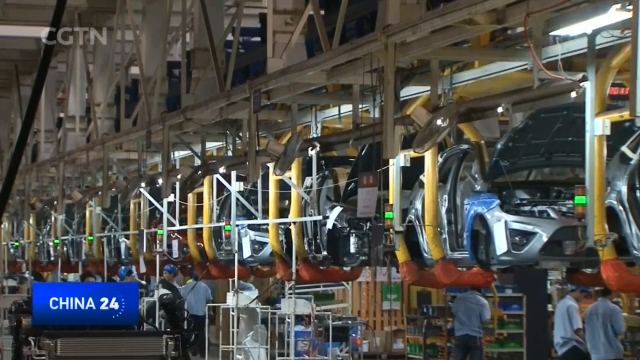
20:55, 10-Oct-2018
China-US Trade Tension: IMF warns tarrif war threaten global financial stability
Updated
20:39, 13-Oct-2018
03:04

Global financial experts warn that trade tensions between the US and China will impact many more economies besides their own. The International Monetary Fund issued its Global Financial Report Wednesday, signalling that the trade spat will take a toll on global financial stability. CGTN's Li Jiejun shows us what experts suggest to resolve the impasse.
The International Monetary Fund cuts its growth forecast for the United States and China, citing recent tariffs imposed by the world's top two economies on one another.
The US has imposed a 25 percent tariff on 50 billion US dollars worth of Chinese imports, and in September added a 10 per cent tariff on an additional 200 billion worth of Chinese products.
In the event the US slaps tariffs on all Chinese imports, as President Donald Trump has threatened to do, the IMF says it will probably cut US GDP by more than 0.9 percent in 2019, with Chinese economic output likely to fall 1.6 percent.
Experts say the world economy would suffer.
TOBIAS ADRIAN, FINANCIAL COUNSELLOR MONETARY & CAPITAL MARKETS DEPARTMENT, IMF "What we have seen already in China is that financial conditions have tightened significantly this year. And the trade tensions are one of the factors that have led to this decline in investor confidence in China. The danger is that at some point, those trade tensions are going to impact investor confidence hence global financial conditions. We know from economic analysis that those confidence shocks can have significant adverse consequences for macro economic activities."
Analysts say the recent US tariffs will more than likely escalate, having an adverse effect on confidence, assets and investment. Ten years since the US financial crisis, the tariff hikes have derailed economic recovery and suppressed growth prospects. Facing rising US protectionism and unilateralism, many experts call for countries to maintain multilateralism.
TAKEHIKO NAKAO, PRESIDENT ASIAN DEVELOPMENT BANK "The trade system is important and it has benefited all the countries. Asian economists studied that it should be a more open trading system, including economists in China, India, Indonesia. It's very important."
ANNA ILYINA, DIVISION CHIEF MONETARY & CAPITAL MARKETS DEPARTMENT, IMF "The fund has always been very clear that they need to support the multilateral approach to solve global problems in various areas, in trade as well as in financial regulation."
LI JIEJUN BALI, INDONESIA "Observers say that eroding the multilateral trading system will disrupt existing global trade rules and destabilize the economic expansion. The trade barrier will hurt businesses and consumers around the world, including those in the United States. LJJ, CGTN, Bali, Indonesia."

SITEMAP
Copyright © 2018 CGTN. Beijing ICP prepared NO.16065310-3
Copyright © 2018 CGTN. Beijing ICP prepared NO.16065310-3